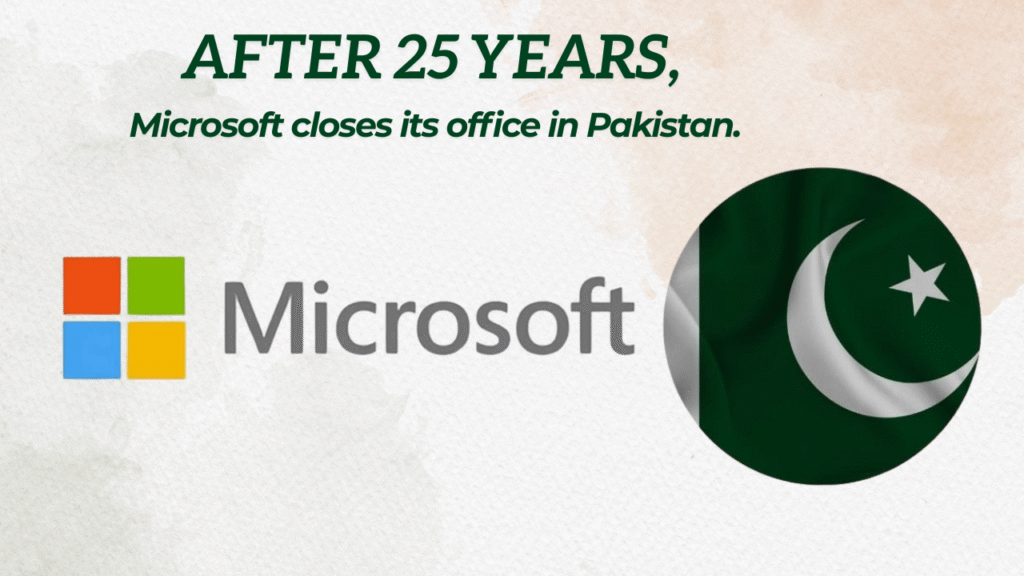After 25 years, Microsoft closes its office in Pakistan.

The company claims that its services will still be offered in Pakistan through regional hubs and resellers.
This action is a component of their global personnel reduction and reorganization strategy.
Microsoft has announced that it is closing its local office in Pakistan, ending a 25-year involvement in the already precarious tech sector. Instead of having a physical presence in Pakistan, the computer giant will now serve Pakistani clients remotely through its regional hubs and authorized resellers as part of its global staff reduction strategy. In a statement to TechCrunch, Microsoft acknowledged the change, claiming it is consistent with a methodology it currently employs in a number of nations. The business was eager to guarantee that current client contracts and services would not be impacted and that support quality would not change.
Despite only having a local impact on five people, the move has shocked Pakistan’s tech and business circles. The primary focus of these personnel was enterprise sales of Microsoft services, including Office and Azure. Microsoft never set up an engineering or development base in Pakistan, unlike in India, instead focusing on sales and liaison activities. However, the retreat is perceived as more symbolic than quantitative, which raises concerns about Pakistan’s attractiveness to global tech companies.
But the action comes at the same time as Microsoft’s biggest round of layoffs ever, with over 9,000 jobs just eliminated globally. The company’s departure has been ascribed to this broader organizational restructure by Pakistan’s Ministry of Information and Broadcasting. Actually, during the previous five years, Microsoft had been covertly moving key operations like contract administration and licensing to its European center in Ireland.
Jawwad Rehman, the former country head of Microsoft Pakistan, advised the government to move proactively in order to draw in and keep international tech companies. In an open LinkedIn post, he urged the IT ministry to start KPI-driven engagement methods with international corporations, stating that “even global giants like Microsoft find it unsustainable to stay.”
In his social media commentary, former President Arif Alvi called Microsoft’s retreat “a troubling sign for our economic future.” Alvi disclosed that Microsoft had contemplated growing its business in Pakistan but ultimately decided to go with Vietnam because of the country’s more stable political and economic environment. “The chance was missed,” he continued.
Microsoft’s exit has generated more worries, especially as it happened only days after the government announced an ambitious proposal to provide half a million young people around the world IT credentials, including Microsoft’s own. The difference between what policymakers want and what companies actually believe has highlighted the problems facing Pakistan’s digital industry.
Microsoft’s quiet exit shows a bigger problem: Pakistan still hasn’t made a name for itself in the global computer outsourcing market, even though Google is still financing educational projects in the region and is even thinking about making Chromebooks in Pakistan. Regional companies like Huawei often rule Pakistan’s tech sector, while big international companies are more careful. This is different from India, which has a booming IT export market.
Pakistan must recognize that Microsoft’s departure signals a significant shift in the industry. It needs to be stable, have a clear policy direction, and work more with the world tech sector.
Even though its local office is closed, it’s probable that Microsoft goods and services like Windows, Office 365, and Azure will still be available in Pakistan. In the future, regional offices, which may be in the Middle East or Singapore, will be in charge of Pakistani clients. Certified local partners would handle service delivery.





Pingback: Himachal Pradesh University Website Targeted by Pakistani Hackers: 'Do You Think You're Superman or Iron Man?' Message Shocks Users -
Pingback: BREAKING: US Bans TRF, KRF, and Kashmir Resistance as Offshoots of Lashkar-e-Taiba: A Major Diplomatic Win for India -